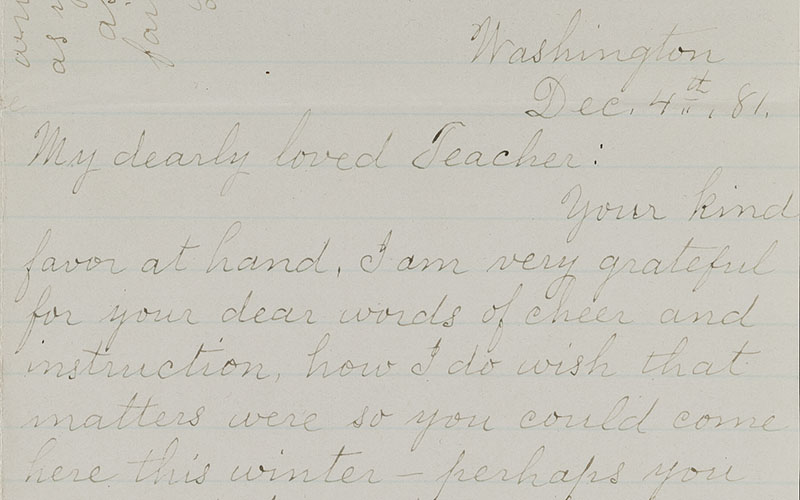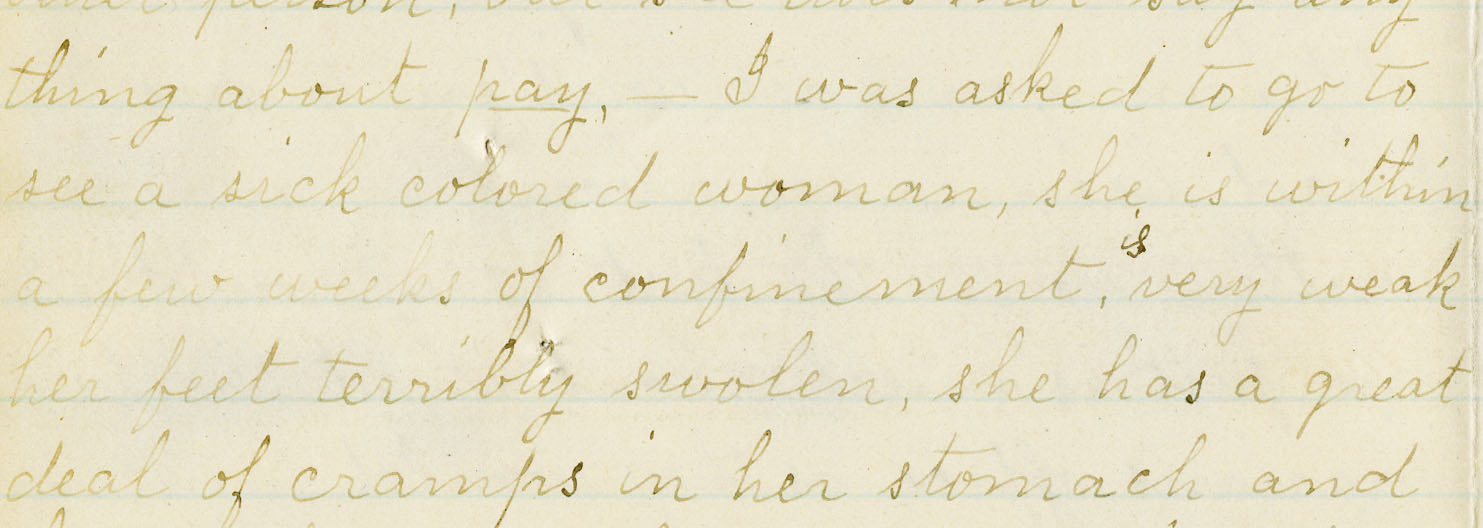Christian Science and African Americans: A new discovery of early healing

Lucinda M. Reeves to Mary Baker Eddy, December 4, 1881, IC139.23.004, https://mbepapers.org/?load=139.23.004.
Until recently, the earliest known encounters African Americans had with Christian Science happened around the turn of the twentieth century.1 In the work of carefully reading and annotating each letter in our collection, the Mary Baker Eddy Papers team recently discovered the account of Lucinda M. Reeves, who received Primary class instruction in Christian Science from Mary Baker Eddy in 1881. That same year she healed members of an African American family in Washington, D.C.
This account unfolds in just three letters that enrich an under-documented chapter in the story of Christian Science healing. Writing from Washington, D.C., in the first weeks and months after Eddy taught her, Reeves revealed to her teacher, in clear, even script, the details of her fledgling Christian Science practice and her sincere efforts to heal as Eddy taught.
One incomplete letter likely dates from late October or early November 1881. In it Reeves introduced Eddy to a potential case for Christian Science treatment through prayer:
I was asked to go to see a sick colored woman, she is within a few weeks of confinement [childbirth]…it is with great difficulty that she can get about at all cannot wait on herself, her little girl about 10 years old has chills and fever, her husband is sick but not so badly off as she is….
Reeves wanted to know if she should take the case. She went on to describe the family’s belief that they were unwell because someone they knew was engaged in “conjuring”—something Reeves referred to as “mesmeric poisoning.” Once having agreed to pray for the family, she reported to Eddy, “I told them to do as near right in every thing as they could and not allow even a bad thought to get into their minds and we would see what power God had over evil. ” Reeves went on to say, “I guess you think I am asking a great many questions but so many different things come up and I want to overcome all the difficulties….”2
While we don’t have Eddy’s response, a month or so later Reeves described the results of her prayer for these patients in another letter:
I treated them each day until Monday I called to see them, the woman opened the door to let me in saying she was much better, the little girl that was in bed Friday with a belief of fever and chills was at school, and the husband was better, last Friday (just one week from the time I first went there) I called again, the woman told me all the pain and soreness in her stomach and bowels was gone, the swelling in her feet going down, and she was feeling strong and had been out for a little walk, she will be confined in a few weeks she says “the Lord must have sent me to her” she is beginning to feel like herself and now has good hopes that she will get through her approaching time all right—. 3
Reeves discussed this family in the next letter to Eddy, reporting that the mother was completely healed:
[M]y “conjured” woman says she is well and wants me to be with her in her confinement which will be in a few weeks…now she can eat and drink whatever she pleases the inflammation and pain is all gone the swelling in her feet is all gone and she sits up and sews until 9 and 10 o’clock nights, she says it is not because she has grown any lighter, for if she was not so heavy she could do hard work.4
Interestingly Reeves’s vivid letters about this family also offer a few details about two other African Americans that she was treating at the time: an unidentified man5 who was working for Eldridge J. and Melinda H. Smith (both students of Mary Baker Eddy) and their longtime servant, Hattie.6 United States Federal Census records from 1880 indicate that Hattie was likely Harriet Briscoe, a servant living in the Smith household. Reeves reported to Eddy in these same letters that Hattie improved significantly as a result of her prayerful treatments. She wrote, “Mrs. Smith told me that it was a perfect miracle how Hattie had gained in her health and spirits, that she seems like another person.”7

Lucinda M. Reeves to Mary Baker Eddy, 1881, IC139.23.012, https://mbepapers.org/?load=139.23.012.
We have 12 letters that Reeves sent to Eddy. To our knowledge none of the letters that Eddy sent in reply are extant. But even without Eddy’s side of the correspondence, Reeves’s letters give us a window into the early practice of Christian Science and help to show how Eddy’s students were making their way as healers. For example Reeves touched on the challenge of going into the African American community as a white woman in a society that was largely segregated. She relied on friends and acquaintances to refer her to these patients.
These letters document Reeves’s efforts to establish a professional healing practice by first treating patients free of charge. She also described dealing with people who did not want to pay for Christian Science treatment: “I can get a plenty of patients, if I don’t charge anything, but I think that when there is money in the question they would prefer to employ a regular M.D.”8 And she shared insights into a visit that Eddy and her husband Asa made to Washington, D.C.9—one of only four trips the Christian Science leader took beyond New England.
We don’t know what ultimately happened in the story of the family that Lucinda Reeves healed. But because she recorded this case in her letters to Eddy, we can trace the impact of Christian Science on the lives of African Americans to a much earlier date in the religion’s history than previously thought.
If you have something to contribute to our archives regarding the history of African Americans in Christian Science, please contact the Library at [email protected]. We’d love to hear stories of your family and community in documenting the history of Christian Science.
- See “Were African Americans involved in the early history of Christian Science?,” Mary Baker Eddy Library, Ask a Researcher, “Were African Americans involved in the early history of Christian Science?”
- Reeves to Eddy, circa November 1881, IC 139.23.012, https://mbepapers.org/?load=139.23.012.
- Reeves to Eddy, 4 December 1881, IC 139.23.004, https://mbepapers.org/?load=139.23.004.
- Reeves to Eddy, 18 December 1881, IC 139.23.005, https://mbepapers.org/?load=139.23.005.
- Reeves to Eddy, 18 December 1881, IC 130.23.005, https://mbepapers.org/?load=139.23.005.
- Reeves to Eddy, circa November 1881, IC 139.23.012; Reeves to Eddy, 4 December 1881, IC 139.23.004, https://mbepapers.org/?load=139.23.004; Reeves to Eddy, 18 December 1881, IC 130.23.005, https://mbepapers.org/?load=139.23.005.
- Reeves to Eddy, circa November 1881, IC 139.23.012, https://mbepapers.org/?load=139.23.012.
- Reeves to Eddy, 18 December 1881, IC 130.23.005, https://mbepapers.org/?load=139.23.005.
- “Mary Baker Eddy’s Trip to Washington, D.C., and Philadelphia,” The Mary Baker Eddy Papers, https://mbepapers.org/?load=mbe_gloss&refid=washington_dc

